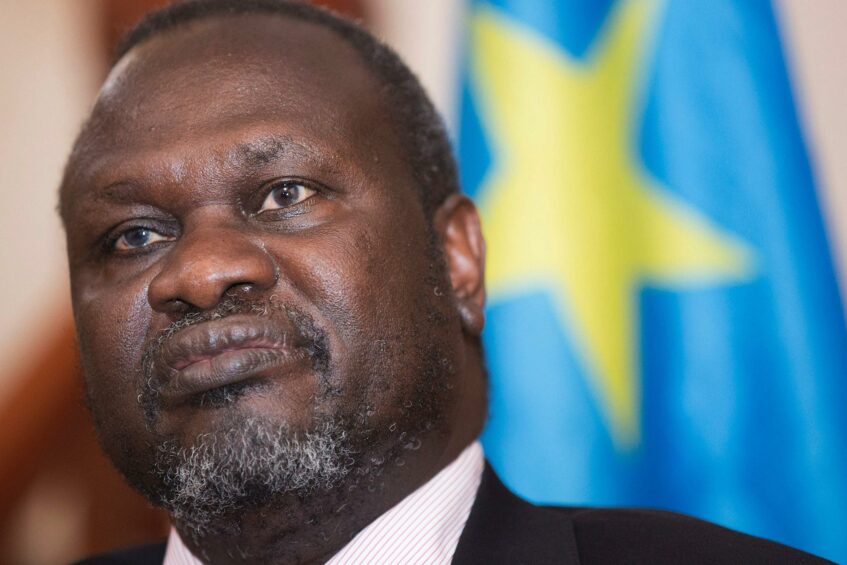
Dr. Riek Machar, First Vice President of the republic of South Sudan - Courtesy
Some opposition groups, including the SPLM-IO, and its leader Dr. Riek Machar, might face obstacles in their transition to party status due to the military affiliation prohibition outlined in the Political Party Council Act, according to a UN panel of expert report.
The expert panel’s report highlighted that some opposition groups, including the SPLM-IO, and its leader Dr. Riek Machar have more to lose from what it described as ‘flawed’ elections in December this year.
The experts say the Political Parties Act, for example, prohibits the registration of political parties with active armed wings. As a result of delays, however, many parties, including SPLM/A-IO, retain armed forces that are still awaiting the second phase of the unification process.
It said electoral officials told the Panel, however, that they believe that this disqualifies the SPLM-IO from registration as a political party in its current form.
In a recent document produced by the Political Parties Council, the SPLM–IO is listed as a “political/armed movement” and not an eligible political party.
It says South Sudan is grappling with a dilemma, adding that many South Sudanese are tired of a political process that has done little to improve lives beyond those of its immediate participants.
According to the Security Council, elections, currently scheduled for December 2024, are therefore seen as a popular means of delivering accountability for leaders widely perceived to have left many of their constituents behind.
It added that despite some achievements, however, much of the revitalized peace agreement is yet to be implemented, and many fear, as a result, that their still-fragile country is not yet ready for elections.
The council said the continued prominence of President Salva Kiir and SPLM beyond December 2024 is in little doubt, and both have continued to promise elections while pressing ahead with campaigns and mobilization events across the country.
It said opposition groups, including the SPLM-IO, have consequently stressed the need to follow the prescriptions of the peace agreement and to first complete the unification of the country’s disparate security forces, draft a permanent constitution, conduct a census, and engage the country’s displaced populations.
The panel of experts further added that beyond this political calculus, numerous practical obstacles currently also stand in the way of credible elections.
It went on to say the deployment of some unified forces marks an important step towards the implementation of security sector reforms, but recent clashes between the SSPDF and the SPLA-IO, in violation of both the peace and ceasefire agreements, underscore its limitations.
The panel added that insecurity, including land-related violence, persists across much of the country, resulting in deaths, displacement, and serious human rights abuses.
The council said there are no guarantees that elections will deliver on their promise, with the risk that they will become a destabilizing event growing as elections draw nearer without clarity on what kind of contests will be held and what preparations will be in place.
It noted that violence is often a prominent ingredient of South Sudanese politics, and many actors retain both the will and the means to challenge unsatisfactory political outcomes with force.
According to the experts, perhaps the greatest threat of elections, however, is that they consume all political attention to the point of distracting entirely from the deep challenges that will continue to shape peace and security in South Sudan whether votes are cast in December 2024 or not.
It added that the coming months are a critical opportunity for the leaders of South Sudan to work together to manage diverging incentives and expectations before they lead to further instability.
It added that many of the preconditions for elections outlined in the peace agreement remain unimplemented.
As of March 2024, the lengthy process of drafting a permanent constitution is yet to begin, and no census has been conducted. This, in turn, has delayed voter registration and the delineation of political boundaries.
The UNSC said election preparations are also bringing into focus the challenges of planning elections in a context where many of the peace agreement’s provisions are only partially implemented or implemented out of sequence.
Support Eye Radio, the first independent radio broadcaster of news, information & entertainment in South Sudan.
Make a monthly or a one off contribution.
Copyright 2024. All rights reserved. Eye Radio is a product of Eye Media Limited.